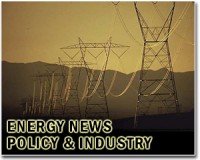 |
Washington (AFP) March 30, 2011 The United States faces tough questions as it tries to plot its energy future in the wake of the Japan nuclear disaster and long-running environmental and security concerns, analysts say. Natural gas appears to be gaining the inside track as the favored short-term energy source although coal, biofuels and renewables such as wind and solar power are also generating interest. A report by the Washington-based Energy Policy Research Foundation says it would be difficult to replace the 5.5 gigawatts of electric generating capacity at US nuclear plants with permits expiring in the next five years. But if it had to be done, "natural gas would be the easiest and most economical," said Ben Montalbano, a senior research analyst at the think tank. Despite efforts to produce clean coal power, he said this "still is in the test tube phase," he added. Renewable sources such as wind and solar energy "require large amounts of land and are very expensive." John Rowe, chairman and chief executive of Exelon, a major US utility operator which operates several kinds of power generators, told a Washington forum recently that if new capacity is needed, "the answer is gas, gas, gas. The economics are driving you in one direction." President Barack Obama, in a speech on energy policy, Wednesday reiterated his goal of cutting oil imports as part of his "Blueprint for A Secure Energy Future," as he called for more use of domestic natural gas and biofuels. Daniel J. Weiss, senior fellow at the left-leaning Center for American Progress think tank, praised Obama's proposal but called for a "more aggressive" energy strategy that would derive at least 35 percent of electricity from renewable sources such as wind, solar, tidal and geothermal energy. Weiss said the United States needs to move "more quickly because of the urgency to reduce our dependence on oil which has volatile prices and insecure sources." Separately, US officials in March announced coal lease sales in Wyoming's Powder River Basin that contain an estimated 758 million tons of low sulfur coal. "Coal is a critical component of America's comprehensive energy portfolio," said Interior Secretary Ken Salazar. But with coal seen as too dirty and oil clouded by the massive BP oil spill in the Gulf of Mexico last year, much of the focus is now on natural gas. Fueling interest in gas is what is believed to be a massive reserve in the so-called Marcellus Shale over a wide area of the eastern United States. Pennsylvania State University's Terry Engelder estimates that the Marcellus shale holds between 168 trillion and 516 trillion cubic feet of gas that can be "easily produced." Yet extraction requires a controversial practice of hydraulic fracturing or "fracking" -- injecting water mixed with chemicals into the rock formation. Concerns have risen that fracking can pollute groundwater with toxic chemicals and possibly radioactive elements. Montalbano said any worries about pollution from fracking can be solved with "simple engineering fixes." But New York state has imposed a temporary moratorium on horizontal fracking, and some members of Congress are skeptical. Representative Ed Markey has asked the Environmental Protection Agency for details on the practice. "The natural gas industry has repeatedly claimed that fracking can be done safely. We now know we need a full investigation into exactly how fracking is done and what it does to our drinking water and our environment," Markey said in a February letter to the EPA. The EPA has begun a review of fracking, findings of which are to be released in 2012. Ernest Moniz, head of the Energy Initiative of the Massachusetts Institute of Technology and a member of the president's science advisory council, said that even though natural gas appears to be more economical, a national energy strategy should not rely on a single source. "We have been through many significant excursions in natural gas prices over the last decade, resulting in caution about committing to only one fuel source," he told a congressional panel. Still, the new caution since the nuclear accidents in Japan means "the cost of doing business at nuclear reactors will go up," he said. Moniz, appearing before a congressional panel, said "small modular reactors" may be a better option for nuclear energy but would take time to develop. Natural gas will likely be a short-term option amid pressures to reduce carbon emissions, he added. "Natural gas does have emissions, but far less than coal, and will serve as a bridge to a very low emissions future," he said. Weiss of the Center for American Progress said a big obstacle to any energy strategy is political. He said the Republican opposition has been "reluctant to boost clean alternative sources at the expense of big oil."
Share This Article With Planet Earth
Related Links
 Report: China leads in low-carbon energy
Report: China leads in low-carbon energyWashington (UPI) Mar 29, 2011 China is the world's leading investor in low-carbon energy technology, a global study by a U.S. environmental polling organization has shown. The study, published by the U.S. Pew Environment Group, showed that the Chinese invested $54.4 billion in the technology in 2010, up from $39.1 billion in 2009, the BBC reported Tuesday. While investment by the United States increased by 51 ... read more |
|
| The content herein, unless otherwise known to be public domain, are Copyright 1995-2010 - SpaceDaily. AFP and UPI Wire Stories are copyright Agence France-Presse and United Press International. ESA Portal Reports are copyright European Space Agency. All NASA sourced material is public domain. Additional copyrights may apply in whole or part to other bona fide parties. Advertising does not imply endorsement,agreement or approval of any opinions, statements or information provided by SpaceDaily on any Web page published or hosted by SpaceDaily. Privacy Statement |